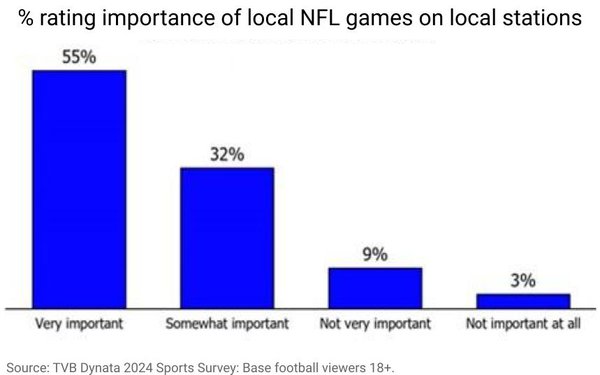
Normally, I resist covering self-serving media trade association
studies -- like the TVB's shown above -- touting the value of their medium. And while I'm not surprised that the vast majority of American football fans consider it important to have their local
team's games available on their local broadcast TV stations, I'm calling this one out for a couple of reasons, including the fact that the NFL season has just gotten underway, and I'm starting to
notice some wear-out among diehard NFL fans frustrated with the who, what, when and where they can catch the gridiron action.
Specifically, I'm citing my brother, a Long Island native and
lifelong Giants fan who would never miss a game -- on TV, if not in person.
I recently helped my brother cut his cable TV cord and switch to a vMVPD accessed via his broadband connection, just
in time for the start of the season, and I said, "So now you can watch all the games over-the-top."
advertisement
advertisement
His response: "I don't care."
That next sound you hear is hell freezing over.
Rich Mandese doesn't care about watching the NFL?
If that's not an inflection point about the disruptive nature of the NFL's streaming deals play, I don't know what is.
I mean, I
get it. It's raking in the big bucks from Amazon Prime and the ilk, which have deep pockets and are eager to pay up for those rights, because they can justify the longer-term ROI of it, not to mention
shareholder equity.
But if what one of the league's most devoted fans says is true, the NFL may be eating its own long-term equity.
If you lose Rich Mandese as a fan, that's your
base.
Okay, so much for my mother-in-law -- er, I mean brother-from-another-mother -- research.
The TVB's study statistically quantifies what most of our gut already knows.